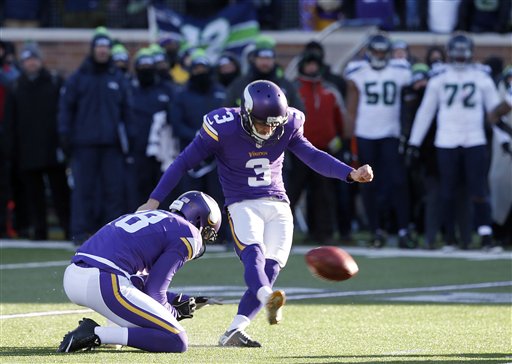Pat Higgins | Sports Editor
Money makes the world go round. If you don’t think so, ask the Minnesota Vikings.
After deactivating star running back Adrian Peterson before Sunday’s game against the Patriots in light of accusations that Peterson disciplined his son earlier this year with a switch (a tree branch), general manager Rick Spielman announced Monday that Peterson would be reactivated for Week 3. Peterson was indicted last Friday on a child abuse charge for hitting his 4-year-old son with a tree branch.
Later Monday night, Radisson, a hotel chain that sponsors the Vikings organization, announced it was suspending its sponsorship with the team.
“Radisson takes this matter very seriously particularly in light of our long-standing commitment to the protection of children,” the company said in a statement. “We are closely following the situation and effective immediately, Radisson is suspending its limited sponsorship with the Minnesota Vikings while we evaluate the facts and circumstances.”
On Wednesday, Nike suspended its contract with Peterson. Company spokesman Kejuan Wilkins said, “Nike in no way condones child abuse or domestic violence of any kind and has shared our concerns with the NFL.” Later that day, Vikings owner Zygi Wilf announced the organization “made a mistake” and deactivated Peterson for a second time, this time placing the running back on the NFL’s exempt list until the case is resolved.
For the second time in as many weeks, league officials found themselves backpedaling in the light of harsh criticism from corporate sponsors and charities. Last week, Goodell announced Ray Rice was suspended indefinitely, just three months after he slapped the former Ravens running back on the wrist with a two-game suspension.
The Denver Broncos and Seattle Seahawks will face off in a Super Bowl rematch this Sunday afternoon at 4:25 p.m., but that’s the last thing you’ll hear anyone talking about when the subject of the NFL comes to mind. The shield that Comissioner Roger Goodell says he works so hard to protect continues to take heavy fire from all angles.
So why has the NFL been enacting reactive policy in the last two weeks? Perhaps it’s because league officials in New York, Baltimore and Minnesota looked themselves in the mirror and magically readjusted their moral compasses.
But the more likely answer is money.
The NFL is a business. It’s the richest and most profitable sports league in the world. Reports of players beating their wives and children is bad for business.
When the Vikings play without Adrian Peterson for a week, their chances of winning plummet. They lost badly to the Patriots on Sunday, 30-7. But when corporate sponsors begin suspending contracts in response to irresponsible personnel decisions, the chances of maintaining profits plummet. At the end of the day, that’s what really matters to Goodell and the owners who work under him.
Amheuser-Busch, Pepsico, Campbell’s Soup, McDonald’s and Visa are among the latest league sponsors to publicly communicate their dissatisfaction with the way the NFL has handled the subject of domestic violence.
Amheuser-Busch, a company that pays $200 million annually to advertise on NFL platforms, wrote in a statement that the company is “disappointed and increasingly concerned by the recent incidences that have overshadowed this NFL season.”
McDonald’s added that “domestic violence and abuse are unacceptable behaviors and have no place in sports, or anywhere.”
Surely, the angst these sponsors have voiced have gotten the NFL’s attention. Goodell’s spokesman Brian McCarthy said league officials understand the reasoning for such sharp criticism from these mega-sponsors.
“We are taking action and there will be much more to come,” he said.
Panthers defensive back Greg Hardy, who also faces charges of domestic abuse, was placed on the same exempt list on which the Vikings placed Peterson. More action will likely follow. But what’s most disturbing about the issue of domestic violence and the league’s policing of it is that significant threats to the NFL’s bottom line are the catalyst for change, and not the heinous acts committed by those guilty.




